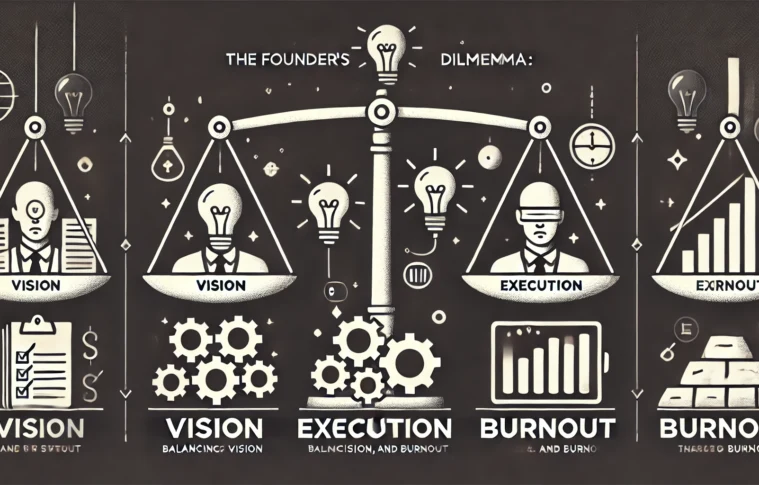Starting a new venture is often likened to a thrilling rollercoaster ride filled with highs and lows. As a founder, you are driven by a powerful vision, but transforming that vision into a successful business involves executing a myriad of tasks and navigating numerous challenges. This journey can lead to what is often referred to as “the founder’s dilemma”—the struggle to balance visionary ambition with practical execution while avoiding the pitfalls of burnout.
Understanding the Founder’s Dilemma
1. The Power of Vision
Vision is the lifeblood of a startup. It represents not just the end goal, but also the underlying purpose that fuels your passion and drives your team. A strong vision is essential for inspiring your team, attracting investors, and differentiating your brand in a crowded marketplace. However, the danger lies in becoming so focused on this long-term vision that you overlook the immediate needs of your business.
- Statistic Insight: According to a study by the Kauffman Foundation, nearly 75% of startups fail due to a lack of market need for their product, highlighting the need for a balanced approach.
2. The Necessity of Execution
While a compelling vision is crucial, execution is what turns ideas into reality. Founders must be adept at wearing multiple hats—strategist, marketer, salesperson, and manager—all while ensuring that the vision remains a guiding star. Effective execution involves making tough decisions, managing resources efficiently, and adapting strategies based on real-time feedback.
- Research Insight: A report from the Harvard Business Review indicates that nearly 70% of startup failures are attributed to poor execution rather than a flawed idea. This underscores the importance of aligning your vision with actionable strategies.
The Burnout Epidemic Among Founders
3. Recognizing Burnout
Burnout is a pervasive issue in the startup ecosystem, often exacerbated by the relentless demands of entrepreneurship. Founders frequently experience chronic stress, fatigue, and a sense of isolation. The pressure to succeed can lead to unhealthy work habits and neglect of personal well-being.
- Statistic Insight: According to a study by the Entrepreneurs’ Organization, 62% of entrepreneurs report experiencing mental health challenges, with burnout being a leading concern.
4. Signs of Burnout to Monitor
- Persistent fatigue or lack of energy
- Decreased motivation or enthusiasm for work
- Difficulty concentrating or making decisions
- Increased feelings of irritability or frustration
- Withdrawal from social interactions
Recognizing these symptoms early can help founders take proactive steps to mitigate burnout.
Strategies to Balance Vision, Execution, and Avoid Burnout
5. Set Achievable Goals
Creating a clear roadmap with SMART (Specific, Measurable, Achievable, Relevant, Time-bound) goals is essential. Breaking down your long-term vision into smaller, manageable milestones helps maintain focus and provides a sense of accomplishment along the way.
- Example: Instead of setting a goal to “dominate the market,” aim for specific customer acquisition targets each quarter.
6. Build a Supportive Team
Surrounding yourself with a capable and diverse team is crucial for alleviating the pressure of execution. Delegating responsibilities not only empowers team members but also allows founders to focus on strategic aspects of the business.
- Research Insight: A study by the Harvard Business School found that startups with well-defined roles and responsibilities are more likely to succeed.
7. Prioritize Self-Care
In the hustle of startup life, self-care often falls to the wayside. However, prioritizing physical and mental health is vital for sustained performance. Founders should incorporate regular exercise, healthy eating, and mindfulness practices into their daily routines.
- Expert Insight: According to mental health experts, regular exercise and mindfulness techniques like meditation can significantly reduce stress and improve cognitive function.
8. Leverage a Mentor or Coach
Having a mentor or business coach can provide valuable insights and guidance. They can help you navigate challenges, offer perspective on your vision, and keep you accountable to your goals. Mentorship can also serve as an emotional support system.
- Resource: Consider joining entrepreneurial organizations or networks where you can connect with experienced mentors in your industry.
9. Embrace Flexibility
While having a strong vision is essential, being flexible allows founders to adapt to changing circumstances. The startup landscape is inherently unpredictable, and remaining open to change can lead to innovative solutions and new opportunities.
- Example: Companies like Instagram began as a location-based check-in app (Burbn) before pivoting to a photo-sharing platform that defined its success.
Conclusion: Navigating the Founder’s Journey
The journey of a startup founder is filled with challenges, but the rewards can be extraordinary. By understanding the founder’s dilemma of balancing vision, execution, and burnout, entrepreneurs can implement strategies that foster a healthier work environment and sustainable growth.
Embracing realistic goal-setting, building a strong team, prioritizing self-care, leveraging mentorship, and remaining flexible can help founders navigate their journey more effectively. Ultimately, maintaining this balance not only enhances personal well-being but also sets the foundation for a thriving business.



